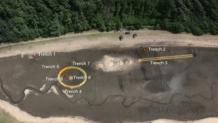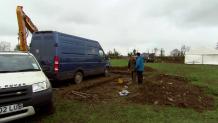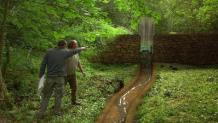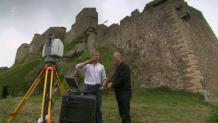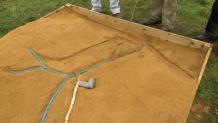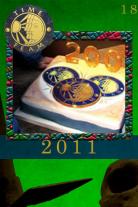
Time Team (1994)
Time Team is a British television series which has been aired on British Channel 4 from 1994. Created by television producer Tim Taylor and presented by actor Tony Robinson, each episode featured a team of specialists carrying out an archaeological dig over a period of three days, with Robinson explaining the process in layman's terms. This team of specialists changed throughout the series' run, although has consistently included professional archaeologists such as Mick Aston, Carenza Lewis, Francis Pryor and Phil Harding. The sites excavated over the show's run have ranged in date from the Palaeolithic right through to the Second World War.
User rating:
18x01 Tottiford Reservoir, Devon - Reservoir Rituals
06 February, 2011 6:00 pm
The first stone henge to be discovered in Britain for a century would be cause enough for major celebration. But there's double bubbles as Tony Robinson and his hardy team of archaeologists celebrate their 200th dig.
The site is the bed of a Devon reservoir with a strange assortment of prehistoric remains. The reservoir has been specially drained, but the diggers still face three days of wading through thick, sticky mud as they piece together the story of thousands of years of rituals performed in this beautiful secret valley high up on Dartmoor.
The Team slowly uncover a network of monuments that suggest they have found a major prehistoric site. But the best discovery is left until the last day when they unearth the remains of that stone henge. It's the perfect end to a milestone in the programme's history
18x02 West Langton, Leicestershire - Saxon Death, Saxon Gold
13 February, 2011 6:00 pm
Tony Robinson takes his merry band of archaeologists to Leicestershire to investigate life and death in Anglo Saxon Britain. The Team are intrigued by metal detecting finds and pottery scattered across the fields, which suggest they're on the site of a high-status Anglo Saxon burial ground.
By the end of the first day there's no sign of a cemetery, in spite of the evidence. But all that changes the next morning with a flurry of activity revealing burials, cremations and a glimpse of gold. Days of frantic digging reveal every type of Anglo Saxon burial - and perhaps the finest piece of jewellery ever discovered on Time Team.
And the Team explore the unique way the Anglo Saxons celebrated their dead, when one brave digger stands in for a dead Anglo Saxon on a funeral pyre, in a fiery recreation of a cremation.
18x03 High Ham, Somerset - Romans on the Range
20 February, 2011 6:00 pm
Tony and the Team get a unique opportunity to dig at an army firing range at High Ham in Somerset, and investigate a series of mosaics first discovered 150 years ago. The mosaics hint at a grand villa but as this part of Somerset has been in constant use by the army for the last century and a half, no one has ever had a chance to really see what's under the ground. To everyone's surprise the initial results suggest there's been more than one villa on this site. Over the following days a story emerges of the highs and lows of Roman life in Britain, from the grand rooms used for entertaining to the pitiful lives of the slaves who lived on the edge of this high society. The archaeology is impressive but the weather's not, and as the temperatures plummet the Team hold a crisis meeting. Could this be the first time in the programme's history that the conditions force the diggers to down tools?
18x04 Les Gellettes, Jersey - Hitler's Island Fortress
27 February, 2011 6:00 pm
Tony Robinson doesn't usually get to decide where the Team should dig, but in this episode he chooses his first ever site for investigation: a German anti-aircraft battery built during the Nazis' five-year occupation of Jersey.
The archaeologists have never investigated anything like this before and must apply all their skills to make sense of a site now reclaimed by a forest. It's soon clear that the gun emplacements are part of a much bigger, complex fortified settlement that was home to hundreds of German soldiers equipped with a vast array of weapons.
And, unlike with older sites, the Team can talk to people who witnessed life under the occupation at first hand.
What emerges is the shocking story of a fortress island where German installations were built by slave labour and the local population began to starve as the war continued. Of terrible conditions that seem more fitting to the eras the Team usually investigate, rather than just 70 years ago.
Over three days Time
18x05 Derwentcote, County Durham - The Furnace in the Forest
06 March, 2011 6:00 pm
Dense and tranquil woodland in the County Durham countryside seems an unlikely venue for Time Team's investigation into the earliest days of the Industrial Revolution. But 200 years ago Derwentcote was at the heart of an iron and steel-producing complex that fuelled the spread of empire.
Over three days the Team fight through the undergrowth to reveal the furnaces and forges that produced the raw materials of industry under appalling conditions.
As well as their chainsaws and mechanical diggers, the archaeologists draw on an unusual resource: the memoirs of an 18th-century industrial spy who visited the site. And with the help of old records they can even put names and trades to the people who occupied the workers' cottages that once stood alongside the works.
It's a story of how cottage industry gave way to the might of the industrial cities such as Sheffield, and the Team uncover the highs and lows of the working life of Derwentcote. On top of all that, Tony discovers how ex
18x06 Castor, Cambridgeshire - Under the Gravestones
13 March, 2011 6:00 pm
The Team face one of their strangest challenges ever: digging through a church graveyard in search of what could be one of the largest Roman structures ever built in Britain. Tony Robinson and his band are here at the request of the Reverend William Burke, vicar of the historic St Kyneburgha's church in Castor, Cambridgeshire. Under very close supervision, the Team must dodge the thousands of burials in the graveyard to get to an ornate mosaic floor that was reportedly discovered almost 200 years ago. It could be the missing link in a village that is crammed with massive Roman walls and old reports of exquisite finds.
18x07 Groby, Leicestershire - House of the White Queen
20 March, 2011 6:00 pm
Groby Old Hall in Leicestershire was once home to the legendary White Queen: Elizabeth, the wife of Edward IV. The Team are here to help the new owners, who have saved the house from dereliction, to find out what has gone on in their garden over the centuries. It's full of tantalising glimpses of archaeology: a medieval wall with a window, carved stones and what looks like the remains of a Norman castle.
18x08 Mont Orgueil, Jersey - Cannons v Castles
27 March, 2011 6:00 pm
Tony Robinson and the Team head across the Channel to Jersey to investigate the origins of Mont Orgueil Castle: a fortress that came to symbolise the Channel Islands' bond with Britain. The massive castle that dominates the shore today is a Tudor structure built on earlier foundations, and it's that early castle, built by King John, that the Team are looking for.
18x09 Llancaiach Fawr, South Wales - Mystery of the Manor Moat
03 April, 2011 6:00 pm
Tony Robinson and the Team descend on the historic Llancaich manor house to investigate an archaeologist's dream. An ancient moat has been discovered in the next field and no one knows what it once protected. It may have surrounded an early Welsh chapel, a Roman Fort, a fortified cattle enclosure, or even the ancestral home of one of Wales's most important families: the Pritchards. A big empty field with a manor house in it is what geophysics was invented for, but what should be a straightforward search quickly becomes one of the most baffling and frustrating investigations Time Team have undertaken for a long time. As the three-day limit approaches the digging becomes more and more frantic, as fields and gardens are overturned by the diggers trying to get to grips with the missing manor. Even if very little is as it seems, they do discover that the history of the site goes back thousands of years earlier than they expected.
18x10 Buck Mill, Somerset - Search for the Domesday Mill
10 April, 2011 6:00 pm
When Stephen and Stephanie Fry bought a few acres of prime Somerset pasture to graze their horses, they inadvertently also bought the remains of Buck Mill, an 18th-century water mill. But as Stephanie began to look into its history, she realised that there may have been a flour mill on the site since Domesday. So she called in Tony Robinson and the Team to help her unravel the mystery of their mill. For Professor Mick Aston, the prospect was too good to turn down. As the diggers get to work uncovering the whole of the 18th-century mill, Mick takes off into the landscape to look for clues from earlier centuries. He finds more than he bargained for: the whole area was awash with the tell-tale mill streams needed to power grindstones. The dig throws up constant reminders of the importance of wheat and bread to the medieval population, and of how rich millers could become. The only spanner in the works for this industrial dig is the surprise discovery of an Anglo Saxon comb.
Video Gallery
Coming Soon...
Photo Gallery
Coming Soon...

